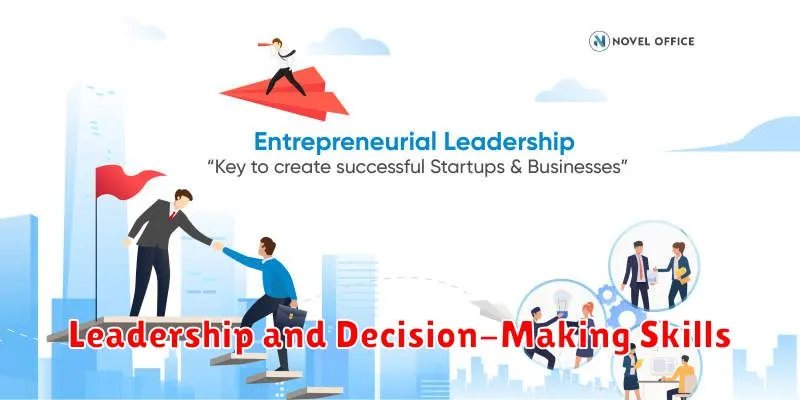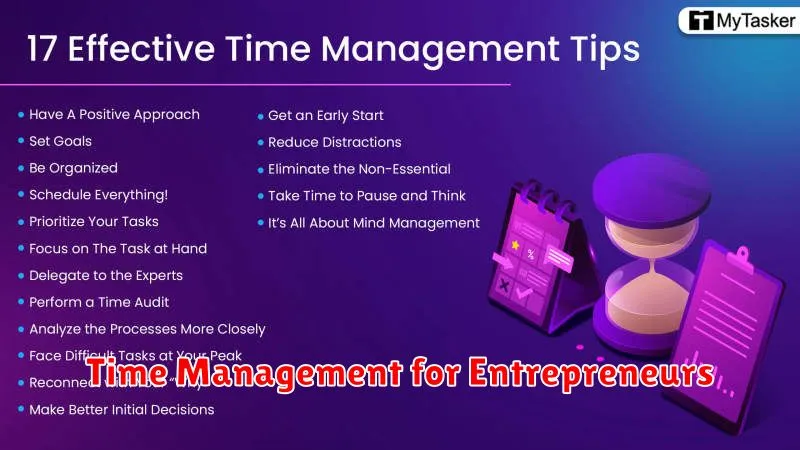Are you aspiring to launch your own business? Becoming a successful entrepreneur requires more than just a great idea; it demands a diverse skill set. This article outlines the essential skills every entrepreneur should master to navigate the complexities of the business world, from securing funding and building a strong team to mastering marketing and effectively managing finances. Learn how to develop these crucial skills to increase your chances of building a thriving and sustainable enterprise. Discover the key competencies that separate successful entrepreneurs from the rest.
Leadership and Decision-Making Skills

Leadership and decision-making are intertwined skills crucial for entrepreneurial success. Effective leaders inspire and motivate teams, fostering a collaborative environment conducive to innovation and growth. This requires strong communication, empathy, and the ability to delegate effectively.
Decision-making, often under pressure and with incomplete information, demands a structured approach. Entrepreneurs must analyze data, weigh risks and rewards, and make timely choices. Developing strong analytical skills, coupled with the ability to adapt quickly to changing circumstances, is paramount.
The ability to effectively lead a team and make sound, strategic decisions directly impacts an entrepreneur’s ability to navigate challenges, seize opportunities, and ultimately achieve their business objectives. These skills are not innate; they are honed through experience, continuous learning, and self-reflection.
Effective Communication for Business Success
Effective communication is paramount for entrepreneurial success. It’s the cornerstone of building strong relationships with clients, investors, and employees.
Clear and concise messaging is crucial. Entrepreneurs must be able to articulate their vision, mission, and value proposition succinctly and persuasively.
Active listening is equally important. Understanding the needs and perspectives of others fosters collaboration and builds trust.
Adaptability in communication style is essential. Tailoring your approach to different audiences ensures your message resonates effectively.
Mastering both written and verbal communication is key. This includes crafting compelling proposals, delivering impactful presentations, and maintaining professional email etiquette.
Nonverbal communication also plays a significant role. Body language, tone of voice, and facial expressions all contribute to the overall message.
By prioritizing and developing strong communication skills, entrepreneurs can significantly enhance their chances of achieving business success.
Basic Financial and Budgeting Skills

Financial literacy is paramount for entrepreneurs. Understanding basic accounting principles is crucial for tracking income and expenses accurately. This includes knowing how to use a simple accounting software or spreadsheet to record transactions and generate reports.
Budgeting is equally essential. Entrepreneurs need to create realistic budgets that project income and expenses, allowing them to manage cash flow effectively. This involves forecasting future needs and allocating funds accordingly to cover operational costs, marketing expenses, and personal needs. Regular review and adjustment of the budget is key to staying on track.
Understanding key financial ratios such as profit margins and return on investment (ROI) allows entrepreneurs to assess the financial health of their business. This enables informed decision-making related to pricing strategies, cost control, and investment opportunities.
Developing strong financial planning skills is crucial for long-term success. This involves setting realistic financial goals, developing strategies to achieve those goals, and regularly monitoring progress. This also includes considering different funding options for business growth, such as loans or equity investments.
Marketing and Branding Know-How
Marketing and branding are intertwined, crucial skills for any entrepreneur. Effective marketing involves understanding your target audience, crafting a compelling value proposition, and choosing the right marketing channels to reach them. This includes both online strategies like SEO and social media marketing, and offline tactics such as networking and public relations.
Branding goes beyond marketing; it’s about creating a distinct identity for your business. This includes developing a strong brand name, logo, and messaging that resonates with your target audience and clearly communicates your unique selling proposition (USP). A consistent brand voice across all platforms is essential for building brand recognition and loyalty.
Mastering these skills requires a combination of creative thinking, analytical skills to measure campaign effectiveness, and an understanding of market trends. Continuously learning and adapting to evolving consumer preferences is vital for long-term success.
Adaptability in Changing Markets
In today’s dynamic business landscape, adaptability is no longer a desirable trait; it’s a necessity for entrepreneurial success. Markets shift constantly, influenced by technological advancements, economic fluctuations, and evolving consumer preferences. Entrepreneurs who can flexibly adjust their strategies, products, and services to meet these changes are more likely to thrive.
This adaptability manifests in several key ways. It involves actively monitoring market trends, identifying emerging opportunities and threats, and proactively adjusting business models accordingly. It also requires embracing innovation and being open to experimentation, testing new approaches and discarding those that don’t yield positive results. Crucially, adaptable entrepreneurs foster a culture of continuous learning within their organizations, encouraging employees to embrace change and develop new skills.
Effective communication and strong decision-making skills are also crucial components of adaptability. Entrepreneurs must be able to quickly assess situations, communicate changes clearly to their teams, and make timely decisions that mitigate risks and capitalize on emerging opportunities. The ability to pivot swiftly and efficiently, while maintaining a clear vision, is the hallmark of a truly adaptable entrepreneur.
Ultimately, adaptability is a mindset – a commitment to continuous improvement and a willingness to embrace the unknown. It’s a skill that can be honed through experience, learning, and a proactive approach to navigating the ever-changing world of business.
Negotiation and Conflict Resolution
Negotiation and conflict resolution are crucial skills for entrepreneurs. Successfully navigating disagreements and reaching mutually beneficial agreements are vital for building strong relationships with clients, partners, and employees.
Effective negotiation involves clear communication, active listening, and understanding different perspectives. Entrepreneurs must be able to articulate their needs and interests while also considering the needs of others. This includes identifying common ground and finding creative solutions that satisfy all parties involved.
Conflict resolution requires a proactive approach. Entrepreneurs should be able to identify potential conflicts early, address them directly and respectfully, and work towards constructive solutions. This often involves mediation or facilitation, helping parties communicate effectively and reach an agreement.
Mastering these skills not only improves business relationships but also fosters a positive and productive work environment, contributing to the overall success and growth of the entrepreneurial venture.
Time Management for Entrepreneurs

Effective time management is crucial for entrepreneurial success. Entrepreneurs often juggle numerous tasks and responsibilities, making efficient time allocation paramount.
Prioritization is key. Learn to identify high-impact activities and focus your energy on those that directly contribute to your business goals. Delegate tasks where possible to free up your time for strategic initiatives.
Planning and scheduling are essential tools. Utilize calendars, to-do lists, and project management software to organize your workload and track progress. Setting realistic deadlines and sticking to them is vital.
Eliminate time-wasting activities. Identify common distractions and proactively minimize their impact. This might involve turning off notifications, scheduling dedicated work blocks, or outsourcing non-essential tasks.
Regular review and adjustment are necessary. Periodically assess your time management strategies and make adjustments as needed. What works well one week might not be as effective the next. Flexibility and adaptation are crucial.
Mastering time management empowers entrepreneurs to maximize productivity, reduce stress, and ultimately achieve greater success.
Continuous Learning and Personal Development
In the dynamic landscape of entrepreneurship, continuous learning and personal development are not merely beneficial; they are essential for survival and success. The ability to adapt, innovate, and overcome challenges hinges on a commitment to ongoing growth.
Mastering new skills is crucial. Entrepreneurs must constantly expand their knowledge base in areas such as finance, marketing, technology, and leadership. This can be achieved through formal education, online courses, workshops, mentorship, and even simply by reading industry publications.
Beyond acquiring specific skills, personal development is equally important. Entrepreneurs must cultivate traits like resilience, adaptability, self-discipline, and effective communication. These soft skills are often the key differentiators between those who thrive and those who falter in the face of adversity.
Self-reflection is a vital component of personal development. Regularly assessing strengths and weaknesses allows entrepreneurs to identify areas requiring improvement and to tailor their learning accordingly. This iterative process fosters continuous growth and allows for a more effective and impactful approach to entrepreneurship.
Ultimately, continuous learning and personal development are not optional extras; they are fundamental pillars upon which entrepreneurial success is built. By embracing lifelong learning and actively working on personal growth, entrepreneurs can equip themselves with the necessary tools and resilience to navigate the complexities of the business world and achieve their goals.

